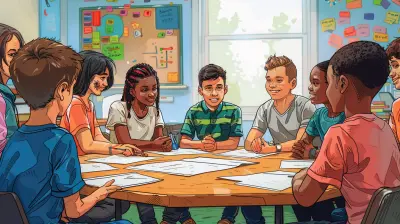Teaching Critical Thinking Through Inquiry-Based Learning
5 February 2025
In today’s fast-paced, information-heavy world, where knowledge is just a Google search away, critical thinking has never been more important. It's not enough for students to memorize facts and figures anymore—they need to know how to think, not just what to think. So, how can educators foster this essential skill? One powerful method is inquiry-based learning (IBL), a teaching approach that promotes critical thinking by encouraging students to question, explore, and seek answers on their own.
Let’s dive into how inquiry-based learning can be a game-changer in teaching critical thinking and why it's the key to preparing students for the real world.
What is Inquiry-Based Learning?
Before we get into the nitty-gritty of how inquiry-based learning fosters critical thinking, let’s first clarify what IBL actually is. At its core, inquiry-based learning is a student-centered approach where learning begins with questions, problems, or scenarios rather than pre-defined answers. Instead of giving students information upfront, this method encourages them to investigate, wonder, and discover answers through exploration and research.In other words, instead of spoon-feeding, students are handed a magnifying glass and sent on a treasure hunt for knowledge. Pretty cool, right?
The Key Elements of Inquiry-Based Learning
A successful IBL environment relies on a few key components:- Questioning: Students are encouraged to ask thoughtful, open-ended questions.
- Research: Learners actively gather information to answer these questions.
- Critical Thinking: Students analyze, evaluate, and synthesize the information they collect.
- Reflection: After the inquiry, students reflect on what they’ve learned and how they arrived at their conclusions.
Now, let’s talk about why all of these elements are a recipe for developing top-notch critical thinking skills.
How Inquiry-Based Learning Develops Critical Thinking
1. Encourages Deep Questioning
In a traditional classroom, the teacher often poses questions, and students respond with pre-learned answers. But with inquiry-based learning, students are the ones posing the questions. They’re not just asking any old question either—they’re asking open-ended, thought-provoking questions that don’t have easy answers.Think of it like being a detective. If you were tasked with solving a mystery, you wouldn’t just ask, “Is the butler guilty?” You’d ask, “What clues suggest the butler might be guilty? What other evidence should we consider? Who else had access to the crime scene?” This kind of questioning requires students to think critically by exploring multiple angles and possibilities.
When students practice asking deep, meaningful questions, they begin to approach problems with curiosity rather than simply seeking the “right” answer—this is the essence of critical thinking.
2. Promotes Active Learning
Inquiry-based learning shifts the classroom from passive to active. Instead of sitting back and absorbing information, students become active participants in their own learning journey.Through inquiry, they investigate problems, conduct research, and experiment with different solutions. This hands-on, minds-on approach forces students to engage with the material in a deeper way. They’re not just memorizing—they’re processing, analyzing, and interpreting information, which are all crucial components of critical thinking.
3. Encourages Exploration of Multiple Perspectives
One hallmark of critical thinking is the ability to look at a situation from various angles. Inquiry-based learning naturally encourages this by inviting students to consider different perspectives.For instance, if students are exploring the causes of climate change, they won’t just learn about the science behind it. They might also investigate how political, social, and economic factors contribute to the issue. This broad exploration of multiple viewpoints helps students develop a more nuanced, well-rounded understanding of complex topics.
4. Fosters Problem-Solving Skills
At its heart, inquiry-based learning is all about solving problems. Students are given a question or challenge, and it's up to them to figure out how to tackle it. This builds problem-solving skills, which are a fundamental part of critical thinking.Problem-solving in an IBL environment isn’t about finding the quickest answer—it’s about the process. Students learn to break down a problem, consider various solutions, test their ideas, and reflect on their findings. This iterative process helps them develop resilience and adaptability, both of which are key to critical thinking.
5. Encourages Self-Reflection
Another crucial aspect of critical thinking is self-reflection. Inquiry-based learning provides ample opportunities for students to reflect on their learning process. After completing an inquiry, students aren’t just asked, “What did you learn?” but also, “How did you learn it? What challenges did you face? What would you do differently next time?”This kind of reflection helps students develop metacognitive skills—essentially, thinking about their own thinking. This awareness allows them to become more mindful learners, continually improving their approach to problem-solving and critical thinking.
The Role of the Teacher in Inquiry-Based Learning
It might sound like students are doing all the heavy lifting in inquiry-based learning, but teachers still play a crucial role. In fact, the teacher’s role is more important than ever—but it’s a little different from the traditional “sage on the stage” model.Facilitator, Not Dictator
In an IBL setting, the teacher acts more as a facilitator than a lecturer. Instead of delivering information, they guide students through the learning process. This might mean helping students formulate their questions, offering resources for research, or encouraging them to think more deeply about their findings.Encouraging Curiosity
Teachers can also foster a culture of curiosity by modeling inquisitive behavior. If a student asks a question, the teacher might respond with, “That’s a great question! How do you think you could find the answer?” By encouraging students to seek answers independently, teachers empower them to take ownership of their learning.Providing Scaffolding
Inquiry-based learning doesn’t mean students are left to fend for themselves. Teachers provide scaffolding—the temporary support students need to succeed. This might involve breaking a large question into smaller, more manageable chunks or offering guidance on how to conduct research. The key is to give students just enough support to keep them moving forward without doing the work for them.
Practical Strategies to Implement Inquiry-Based Learning in the Classroom
If you’re a teacher looking to bring more inquiry-based learning into your classroom, here are a few strategies to get you started:1. Start with a Compelling Question
The foundation of any inquiry-based lesson is a good question. Try to avoid yes/no or fact-based questions. Instead, opt for open-ended questions that require students to think critically and explore multiple possibilities. For example, instead of asking, “What is photosynthesis?” you could ask, “How does photosynthesis impact the environment, and how might changes in climate affect it?”2. Create a Rich Learning Environment
Give students access to a wide range of resources—books, articles, videos, experiments, and more. Let them choose how they want to learn and explore the topic. The more diverse the materials, the richer the inquiry process.3. Encourage Collaboration
Inquiry-based learning works well in collaborative settings. Encourage students to work in groups, share ideas, and challenge each other’s thoughts. This group dynamic can spark even more critical thinking as students are exposed to different perspectives.4. Integrate Technology
Use technology to enhance the inquiry process. Online databases, digital simulations, and interactive tools can provide students with new ways to explore their questions and conduct research.5. Allow Time for Reflection
Make sure to build in time for reflection at the end of the inquiry process. You can use journals, group discussions, or presentations to give students an opportunity to reflect on what they’ve learned and how they arrived at their findings.Overcoming Challenges in Inquiry-Based Learning
Of course, no teaching method is without its challenges. Inquiry-based learning requires a shift in both mindset and practice for many teachers and students. Some common challenges include:- Time Constraints: Inquiry takes time, and it can be difficult to fit into a packed curriculum. One solution is to integrate short inquiries into daily lessons rather than dedicating huge chunks of time.
- Student Resistance: Some students may be uncomfortable with the open-ended nature of inquiry-based learning, especially if they're used to more structured environments. Providing clear expectations and initial guidance can help ease them into the process.
- Assessment: Traditional tests don’t always capture the depth of learning that occurs in an inquiry-based classroom. Consider using alternative assessments like projects, presentations, or portfolios to evaluate students’ critical thinking skills.
Conclusion
Teaching critical thinking through inquiry-based learning is a powerful way to prepare students for the complexities of the modern world. By encouraging deep questioning, active learning, exploration of multiple perspectives, and self-reflection, inquiry-based learning equips students with the skills they need to think critically, solve problems, and approach challenges with curiosity and confidence.So, next time you're in the classroom, consider handing your students that metaphorical magnifying glass. Let them explore, question, and discover. You might be surprised at just how much they can learn on their own.
all images in this post were generated using AI tools
Category:
Critical ThinkingAuthor:

Madeleine Newton
Discussion
rate this article
17 comments
Solara McLaughlin
Great insights on integrating inquiry-based learning to foster critical thinking! Encouraging students to ask questions and explore topics deeply not only enhances their analytical skills but also promotes a lifelong love for learning. Looking forward to more practical examples in future posts!
March 4, 2025 at 8:41 PM

Madeleine Newton
Thank you for your feedback! I'm glad you found the insights valuable. I'll be sure to include more practical examples in future posts. Stay tuned!
Chantal Kearns
Great insights on fostering critical thinking in students!
February 27, 2025 at 11:57 AM

Madeleine Newton
Thank you! I'm glad you found the insights valuable.
Sierra Mendez
Great insights on enhancing critical thinking! Inquiry-based learning truly empowers students to explore and engage deeply. Incorporating real-world problems can further enrich their learning experience and foster a love for discovery.
February 26, 2025 at 7:56 PM

Madeleine Newton
Thank you! I completely agree—real-world problems can significantly enhance inquiry-based learning and deepen student engagement. Your insights are much appreciated!
Margaret McCallum
Great insights! Inquiry-based learning truly empowers students to think critically and engage deeply with content.
February 23, 2025 at 8:27 PM

Madeleine Newton
Thank you! I'm glad you found the insights valuable. Inquiry-based learning really does foster critical thinking and deeper engagement.
Ronan Tucker
What a fantastic read! Inquiry-based learning is the key to unlocking curious minds. By encouraging students to question and explore, we’re not just teaching them to think critically; we’re inspiring lifelong learners! Let’s keep fostering that curiosity and watch our classrooms transform into vibrant hubs of discovery. Keep it up!
February 23, 2025 at 1:48 PM

Madeleine Newton
Thank you for your kind words! I completely agree—fostering curiosity through inquiry-based learning truly transforms our classrooms into dynamic spaces for discovery. Let's keep inspiring those lifelong learners!
Molly Wheeler
This article beautifully highlights how inquiry-based learning transforms classrooms into vibrant spaces of exploration. It’s inspiring to see educators embrace critical thinking, encouraging students to ask questions and seek answers. I’m excited to implement these ideas in my own teaching!
February 20, 2025 at 1:18 PM

Madeleine Newton
Thank you for your thoughtful comment! I'm thrilled to hear that you're inspired to implement these ideas in your teaching. Best of luck on your inquiry-based journey!
Lily McFarlin
This article beautifully highlights the importance of inquiry-based learning in fostering critical thinking skills. It provides valuable insights for educators aiming to enhance their teaching methods. Thank you for sharing!
February 20, 2025 at 4:19 AM

Madeleine Newton
Thank you for your kind words! I'm glad you found the article helpful in exploring inquiry-based learning and its impact on critical thinking.
Knox McInerney
Inquiry-based learning fosters critical thinking by encouraging questioning, exploration, and reflection.
February 18, 2025 at 1:46 PM

Madeleine Newton
Thank you for your insight! I completely agree that inquiry-based learning is a powerful approach to enhance critical thinking skills through active engagement and exploration.
Ruby Sharp
Teaching critical thinking through inquiry-based learning? Absolutely! Because who wants students regurgitating facts when they can dissect problems like pros? Let’s arm them with curiosity and the art of questioning—after all, the world needs more thinkers, not mere echo chambers!
February 18, 2025 at 5:26 AM

Madeleine Newton
Thank you for your insightful comment! I completely agree— fostering curiosity and the ability to question is essential for developing true critical thinkers. Let’s inspire our students to navigate complexities with confidence!
Anabella Yates
This article beautifully highlights the transformative potential of inquiry-based learning in fostering critical thinking. By encouraging students to ask questions and explore, we not only enhance their analytical skills but also instill a lifelong love for learning. It’s a powerful approach that deserves more attention in today's classrooms.
February 17, 2025 at 9:17 PM

Madeleine Newton
Thank you for your thoughtful comment! I'm glad you found the article resonates with the importance of inquiry-based learning in developing critical thinking and a love for learning.
Paxton McVicker
Absolutely love this approach! Inquiry-based learning transforms classrooms into vibrant spaces for exploration and curiosity. It not only encourages students to think critically but also fosters a deeper understanding of the material. Excited to see how this method inspires both educators and learners alike!
February 16, 2025 at 5:40 AM

Madeleine Newton
Thank you! I’m glad you resonate with inquiry-based learning. It truly empowers both students and educators to thrive in a dynamic learning environment.
Ardyn Wilkins
Who knew asking questions could be the secret ingredient to unlocking minds? Let's turn classrooms into curiosity kitchens!
February 15, 2025 at 11:55 AM

Madeleine Newton
Absolutely! Inquiry-based learning fosters curiosity and critical thinking, transforming classrooms into dynamic spaces for exploration and discovery.
Nico Fields
Curiosity ignites minds; questions shape our wisdom.
February 14, 2025 at 7:53 PM

Madeleine Newton
Thank you! Curiosity and questioning are indeed the foundations of critical thinking, driving deeper understanding and exploration.
Samantha Lopez
Inquiry-based learning fosters critical thinking by encouraging students to ask questions, explore, and engage deeply with content. This approach not only cultivates analytical skills but also nurtures curiosity, empowering learners to become independent thinkers. Embracing inquiry in education is essential for developing adaptable, innovative minds.
February 12, 2025 at 12:24 PM

Madeleine Newton
Thank you for your insightful comment! I agree that inquiry-based learning is vital for fostering critical thinking and nurturing independent, innovative thinkers in education.
Vito Martin
Inquiry-based learning is essential for fostering critical thinking skills in students. By encouraging curiosity and exploration, educators empower learners to analyze, question, and synthesize information. This approach not only enhances understanding but also prepares students for real-world challenges. Let's embrace inquiry as a core teaching strategy.
February 11, 2025 at 1:27 PM

Madeleine Newton
Thank you for your insightful comment! I completely agree that inquiry-based learning is vital for developing critical thinking skills and preparing students for real-world challenges. Embracing this approach can transform education.
Uriel Cox
Empowering minds through curiosity and questions!
February 9, 2025 at 8:39 PM

Madeleine Newton
Thank you! Curiosity is indeed the foundation of critical thinking and inquiry-based learning. Let's continue to inspire minds!
Emmett Dodson
Inquiry sparks minds; ignite their potential!
February 5, 2025 at 9:57 PM

Madeleine Newton
Thank you! I believe inquiry-based learning truly empowers students to think critically and unlock their full potential.
MORE POSTS

Decoding Digital Media: A Guide to Understanding Online Information

Bridging the Gap Between Theory and Practice in Educational Research

Cooperative Learning Strategies for Group Activities

The Connection Between Media Literacy and Democracy

How School Funding Impacts Student Success

How to Balance Work, Life, and College Studies

The Connection Between Math and Music: A Harmonious Relationship

Time Management Tips for Thriving Students

The Importance of Mental Health Days for Students

Exploring Geography Through Hands-On Mapping Activities

Study Techniques for Visual, Auditory, and Kinesthetic Learners